Gender stratification of Russian society in the social dimension
The demand for an objective assessment of the stratification of Russian society in the gender dimension is dictated by the structural social changes and risks of the modern moment, the commitment of Russian society to the value of social justice, interpreted as equality of opportunities, respect for human rights and freedoms regardless of gender. The severity and urgency of the demographic problem in Russia is gender-related, and a search is underway for new foundations for regulating gender relations and involving new components of the social structure for the formation of a healthy and progressive society. The study of the gender stratification of Russian society was conducted on the basis of the analysis of information from international, Russian statistical and sociological data, the author's analysis of data from the Russian Monitoring of the Economic Situation and Public Health (HSE, 2020, N=9831) and data obtained within the framework of the RNF project “Precariat: a new phenomenon in the socio-economic structure of society” (2018-2022, N=1200). The focus of the vision on the economic living conditions of women and men, the situation at work, the combination of health and education indicators is accompanied by the presentation of sociological information on the indices of positive and negative privilege, an assessment of the nature and degree of precarisation of work in the gender aspect. The content of the modern gender agenda reveals the limitations of gender-neutral policies in solving the demographic problem and the movement in favour of gender-sensitive policies, the use of the full potential of gender communities, their combined capital. Gender stratification in Russian society has its own national cultural and historical features, features of the Soviet gender contract, and at the same time shows a new combination, defines the horizons of scientific research. Further research into the social dimension of the processes of feminisation of consumer and reproductive behaviour in the context of the crisis of the family as a social institution, the intellectualisation of the digital economy, gender representation in the elite of development, continuity and modernisation of education is promising for gender as a research programme.
Figures
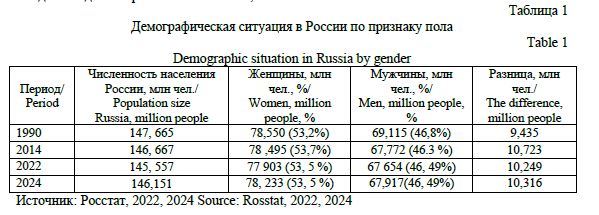
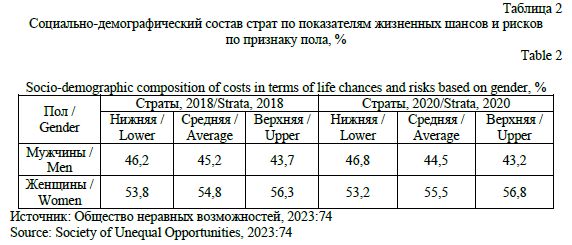
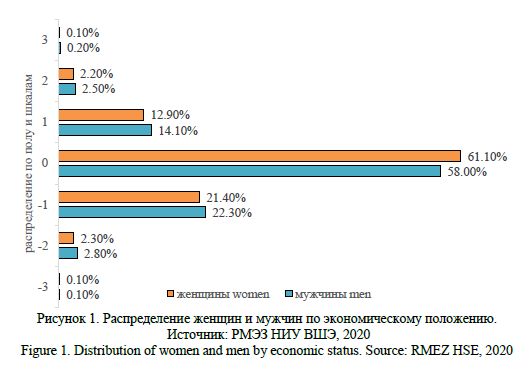

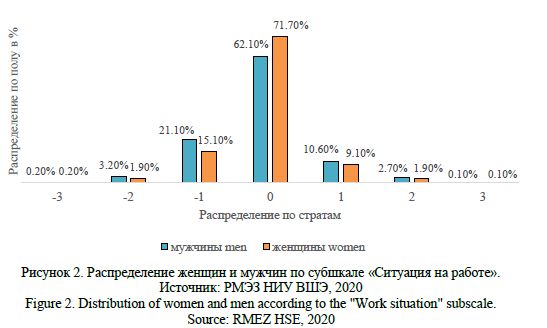
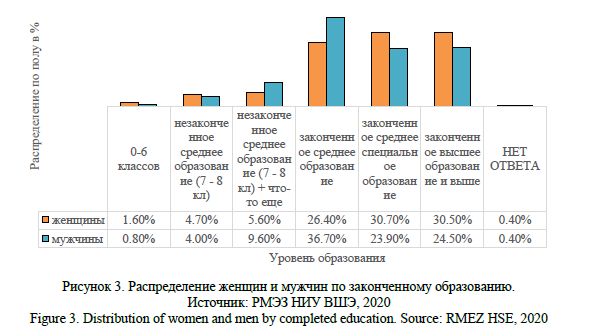
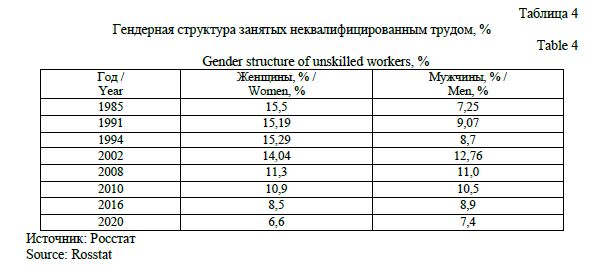
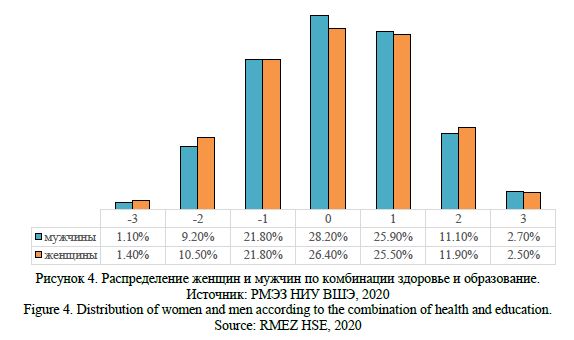
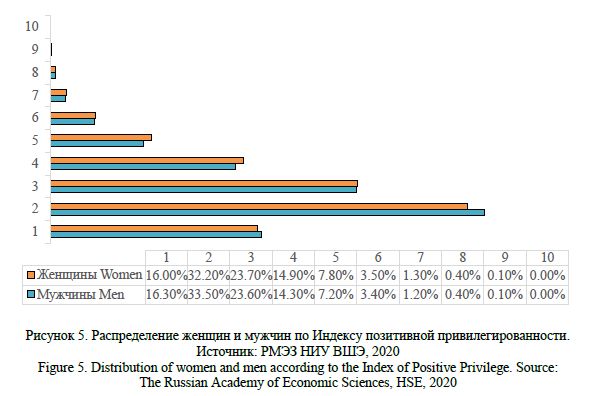
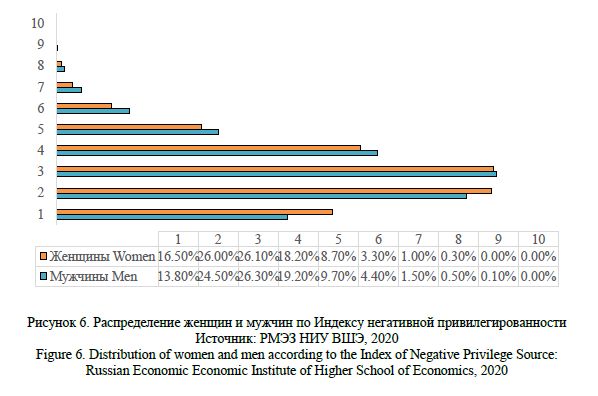
Milovanova, M. Yu. (2025), “Gender stratification of Russian society in the social dimension”, Research Result. Sociology and Management, 11 (1), 161-180, DOI: 10.18413/2408-9338-2025-11-1-1-1.


















While nobody left any comments to this publication.
You can be first.
Aivazova, S. G. (2017), “Features Gender discourse in the field of conservative policy”, Zhenshhina v rossiyskom obshhestve, 4 (85), 3-13, DOI: 10.21064/WinRS.2017.4.1. (In Russian)
Babynina, L. O. (2023), Dinamika gendernogo razryva [Dynamics of the gender gap], [Online], аvailable at: https://analitica.rea.ru/article/makroekonomika–i–my/dinamika–gendernogo–razryva (Аccessed 22 April 2023). (In Russian)
Butler, J. (2001), “From parody to politics”, Introduction to gender studies: Part II, edited by S.V. Zherebkin, St. Petersburg, 164-174. (In Russian)
Bobkov, V. N., Odintsova, E. V., Bobkov, N. V. (2020), “Relevance of developing a national programme to increase income, reduce poverty and inequality”, Uroven zhizni naseleniya regionov Rossii, 16 (2), 9-24, DOI:10.19181/lsprr/2020.16.2.1. (In Russian)
Brushkova, L. A. (2021), “The gender structure of employment in Russia as an indicator of the formation of a new gender order”, Gumanitarnye nauki. Vestnik Finansovogo universiteta, 11 (4), 139-143, DOI: 10.26794/2226-7867-2021-11-4-139-143. (In Russian)
Velikaya, N. M., Ovcharova, O. G. (2020), “The Conservative turn of Russian Society: gender emphasis”, Gendernye resursy i formirovanie novogo gendernogo poryadka v XXI veke [Gender resources and the formation of a new gender order in the XXI century], NII ekonomiki YUFO, Moscow, Russia, 34-43, [Online], available at: https://elibrary.ru/item.asp?id=43938348 (Аccessed 22 April 2023). (In Russian)
Vsemirnoe issledovanie tsennostey 1981-2020 [World values survey 1981-2020], [Online], available at: https://elibrary.ru/item.asp?id=43938348 (Аccessed 22 April 2023). (In Russian)
“Demography”, Federalnaya sluzhba gosudarstvennoy statistiki [Federal State Statistics Service], [Online], available at: https://rosstat.gov.ru/folder/12781 (Аccessed 07 July 2023). (In Russian)
Doklad o Chelovecheskom Razvitii 2021-2022 [Human Development Report 2021-2022], [Online], available at: http (Аccessed December 12, 2023). (In Russian)
Indeks chelovecheskogo razvitiya v Rossii: regionalnye razlichiya. 2021 g. [Human Development Index in Russia: regional differences. 2021], [Online], available at: https://ac.gov.ru/uploads/2–Publications/analitika/2022/_2021_long.pdf (Аccessed 1 August 2023). (In Russian)
Karavai, A. V. (2020), “Factors of inequality of life chances of Russians (experience of empirical analysis)”, Sotsiologicheskaya nauka i sotsialnaya praktika, 8 (1), 63-78, DOI: 10.19181/snsp.2020.8.1.7095. – EDN JBUAAL. (In Russian)
Kochkina, E. V., Kirichenko, M.M. (2003), “Introduction”, Gendernaya rekonstruktsiya politicheskih sistem [Gender reconstruction of political systems], SPb, Russia. (In Russian)
Levada-tsentr, opros 17-21 fevralya 2022 goda po reprezentativnoy vserossiyskoy vyborke naseleniya 1618 chelovek v vozraste ot 18 let i starshe v 137 naselennyh punktah, 50 sub#ektah RF. Issledovanie provoditsa na domu u respondenta metodom lichnogo intervyu [Levada Center, a survey conducted on February 17-21, 2022, based on a representative All-Russian sample of 1,618 people aged 18 and over in 137 localities and 50 subjects of the Russian Federation. The study is conducted at the respondent's home using a personal interview method] [Online], available at: https://www.levada.ru/2022/03/08/gendernoe-ravnopravie-uchastie-zhenshhin-v-politicheskoj-zhizni (Аccessed 19 May 2023). (In Russian)
Meshcheryakova, N. M., Kryshtanovskaya, O. K. (2023), “Smart еlite: conceptual framework”, Sotsiologicheskaya nauka i sotsialnaya praktika, 11(4), 30-52. DOI: 10.19181/snsp.2023.11.4.2. (In Russian)
Milovanova, M. YU. (2022), “Social mood of rural residents in the context of the COVID-19 pandemic: gender aspect”, Zhenshhina v rossiyskom obshhestve, (3), 77-89, DOI: 10.21064/WinRS.2022.3.5 (In Russian)
Milovanova, M. YU., Irsetskaya, E.A. (2023), “Gender balance and social justice as the basis of healthy society. Review based on the materials of the international scientific and practical conference The First Shanyav readings”, Monitoring obshhestvennogo mneniya: ekonomicheskie i sotsialnye peremeny, (3), 279-298, DOI: 10.14515/monitoring.2023.3.2400 (In Russian)
NAFI-2023 [NAFI-2023], [Online], available at: https://nafi.ru/analytics/gendernye-razlichiya-v-semeyno-bytovykh-ustanovkakh-molodezhi (Аccessed August 08, 2023). (In Russian)
Nikolaev, I. A., Marchenko, T. E., Tochilkina, O. S. (2017), Analiticheskiy doklad «Genderny razryv v oplate truda» [Analytical report “Gender Pay Gap”], [Online], available at: https://www.fbk.ru/upload/medialibrary/bce/Gendernyi%20razryv%20v%20oplate%20truda_doklad.pdf (Аccessed 1 July 2022). (In Russian)
Tikhonova, N. E., Mareeva, S. V., Anikin, V. A., Lezhnina, Yu. P., Karavay, A. V., Slobodenyuk, E. D. (2022), Obshhestvo neravnyh vozmozhnostey: sotsialnaya struktura sovremennoy Rossii (Society of Unequal Opportunities: The Social Structure of Modern Russia)”, Ves' Mir, Moscow, Russia, DOI: 10.55604/9785777708731. (In Russian)
Anisimov, R. I., Belova, N. I., Bulanova, M. B. (i dr.) (2022), Ot prekarnoy zanyatosti k prekarizatsii zhizni (From precarious employment to precarization of life), Moscow, Russia. (In Russian).
Peres, K. (2020), Nevidimye zhenshhiny: pochemu my zhivem v mire, udobnom tolko dlya muzhchin. neravnopravie, osnovannoe na dannyh [Invisible women: data bias in a world designed for men], Moscow, Russia. (In Russian)
Anisimov, R. I., Belova, N. I., Bulanova, M. B. (i dr.) (2022), Prekarnaya zanyatost: istoki, kriterii, osobennosti [Precarious employment: origins, criteria, features], Moscow, Russia. (In Russian)
Pugach, V. F. (2022), Chelovecheskie resursy vysshey shkoly Rossii na rubezhe HH–HHI vekov: statistiko-sotsiologicheskiy analiz [Human resources of the higher school of Russia at the turn of the XX–XXI centuries: statistical and sociological analysis], Moscow, Russia. (In Russian)
“Wage gap between men and women”, Zhenshhiny v ekonomike [Online], available at: https://www.economy.gov.ru/material/file/65f53df7ef144f6f6b43ea8529869f52/101965562.pdf (Аccessed 22 April 2023). (In Russian)
Rasporyazhenie Pravitelstva RF ot 29 dekabrya 2022 goda № 4356-r «Ob utverzhdenii Natsionalnoy strategii deistviy v interesah zhenshhin na 2023-2030 gody» [Order of the Government of the Russian Federation of December 29, 2022 No. 4356-p “Ob utverzhdenii Natsionalnoy strategii deistviy v interesah zhenshchin na 2023-2030 gody”], [Online], available at: https://www.consultant.ru/document/cons_doc_LAW_436691/f62ee45faefd8e2a11d6d88941ac66824f848bc2 (Аccessed 20 March 2023). (In Russian)
Rodionova, M. E., Milovanova, M. Yu. (2023), “Features of the implementation of the legal foundations of gender policy in the Russian Federation”, Gendernoe ravenstvo XXI veka: globalnye vyzovy i lokalnye otvety, Obshhestvo s ogranichennoy otvetstvennostyu Izdatelstvo «Klyuch-S», Moscow, Russia. (In Russian)
Rosstat-2021. Rynok truda, zanyjatost i zarabotnaya plata [Rosstat-2021. Labor market, employment and wages], [Online], available at: https://rosstat.gov.ru/storage/mediabank/Wom-Man%202022.pdf (Аccessed 20 March 2023). (In Russian)
Rosstat-2022. Trud i zanyatost v Rossii [Rosstat 2022. Labor and employment in Russia], [Online], available at: https://rosstat.gov.ru/storage/mediabank/Wom-Man%202022.pdf (Аccessed 20 March 2023). (In Russian)
Roshchin, S. Yu., Yemelina, N. K. (2022), “Meta-analysis of the gender pay gap in Russia”, Ekonomicheskiy zhurnal VShJe, 26 (2), 213-239. (In Russian)
Sillaste, G. G. (2019), “The country gender landscape as a factor of a new gender order formation, its social risks”, Zhenshhina v rossijskom obshhestve, (3), 4-13, DOI: 10.21064/WinRS.3.1. (In Russian)
Skott, Dzh. (2001), “Some reflections on gender and politics”, Vvedenie v gendernye issledovaniya: Chast II, SPb, Russia, 946-962. (In Russian)
Toshchenko, Zh. T. (2014), Tezaurus sotsiologii [Thesaurus of sociology], Moscow, Russia. (In Russian)
Temkina, A. (2022), Konservativnyj povorot i gendernye issledovanija v Rossii [Conservative turn and gender studies in Russia], [Online], available at: https://russian.eurasianet.org/ (Аccessed 19 May 2023). (In Russian)
Tikhonova, N. E. (2006), “Resource approach as a new theoretical paradigm in stratification research”, Ekonomicheskaya sotsiologiya, (3), 11-26. (In Russian)
Ukaz Prezidenta Rossisskoy Federatsii ot 21.07.2020 g. № 474 «O natsionalnyh tselyah razvitiya Rossiyskoy Federatsii na period do 2030 goda» [Presidential Decree No. 474 dated 21.07.2020 “O natsionalnyh tselyah razvitiya Rossiyskoy Federatsii na period do 2030 goda”] [Online], available at: http://government.ru/docs/all/128943/ (Аccessed 20 May 2023). (In Russian)
FOMnibus. Ezhenedelniy vserossiyskiy pokvartirny opros. 24-26 fevralya 2023 g.
53 sub#ekta RF, 104 naselennyh punkta, 1500 respondentov. Statpogreshnost ne prevyshaet 3,6% [FOMnibus – weekly All-Russian apartment-by-apartment survey. February 24-26 2023 53 subjects of the Russian Federation, 104 localities, 1500 respondents. The statistical infallibility does not exceed 3.6%], [Online], available at: https://fom.ru/TSennosti/14845 (Аccessed 19 May 2023). (In Russian)
Huber, J. (1990), “Macro-micro-links in gender stratification: the Presidential Address of 1989”, Amerikanskoe sociologicheskoe obozrenie, 55 (1), 1-10, [Online], available at: https://www.jstor.org/stable/i336575 (Аccessed 25 July 2023). (In Russian)
Shevchenko, I. O., Shevchenko, P. V. (2019), “Gender characteristics of precarity”, Sotsiologicheskie issledovaniya, (9), 84-95, DOI: 10.31857/S013216250006671-1. (In Russian)
Shtompka, P. Sh. (2005), Sotsiologiya. Analiz sovremennogo obshhestva (Sociology. Analysis of modern society), Moscow, Russia. (In Russian)
Engels, F. (1989), Proiskhozhdenie semi, chastnoy sobstvennosti i gosudarstva: V svyazi s issledovaniyami Lyuisa G. Morgana (The origin of the family, private property and the State: In connection with the research of Lewis G. Morgan), Moscow, Russia. (In Russian)